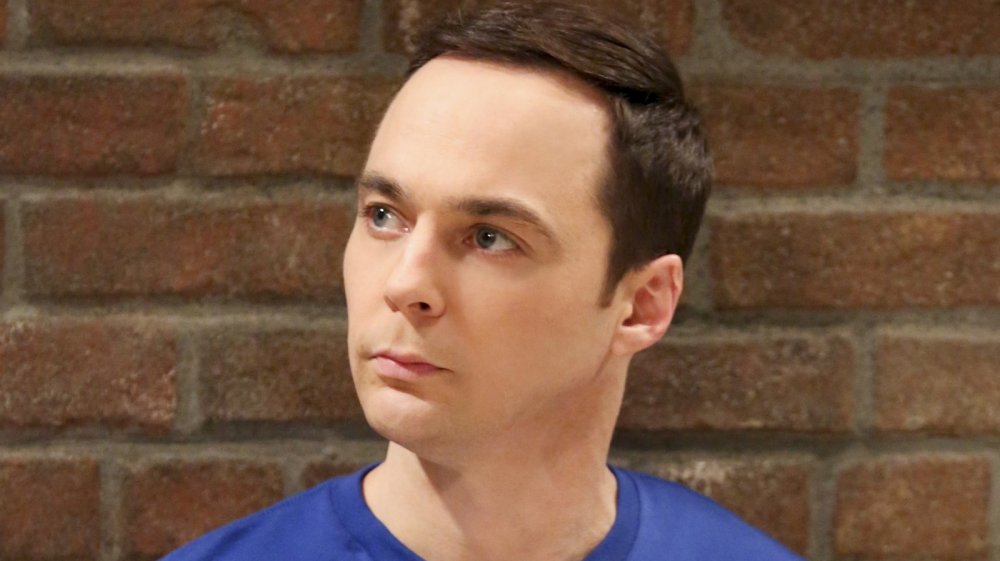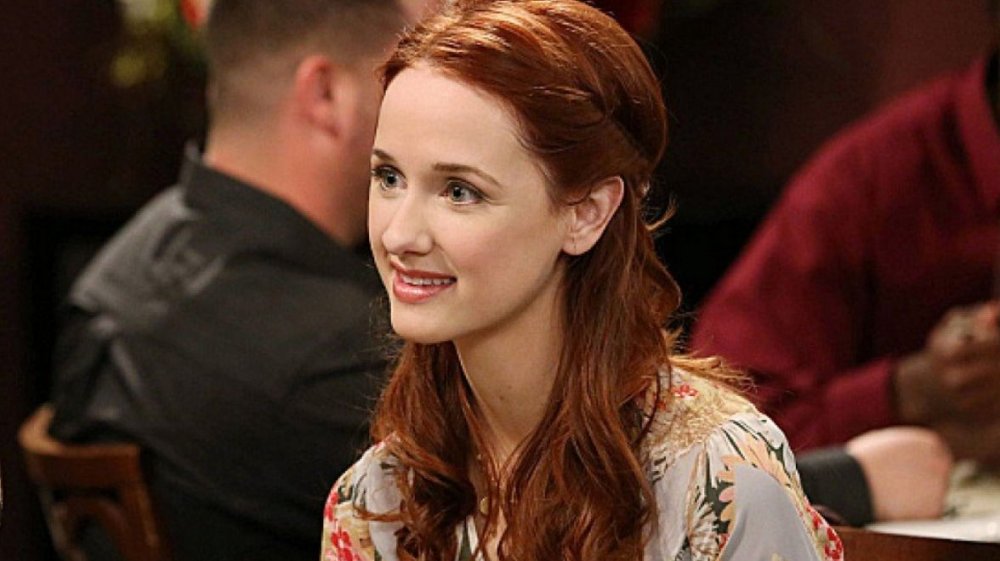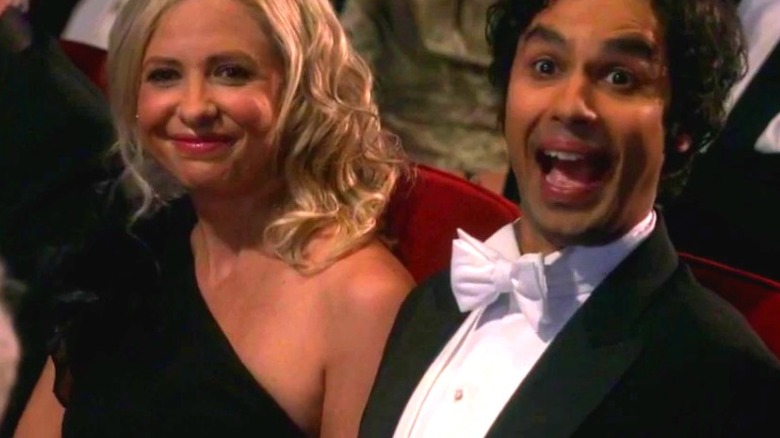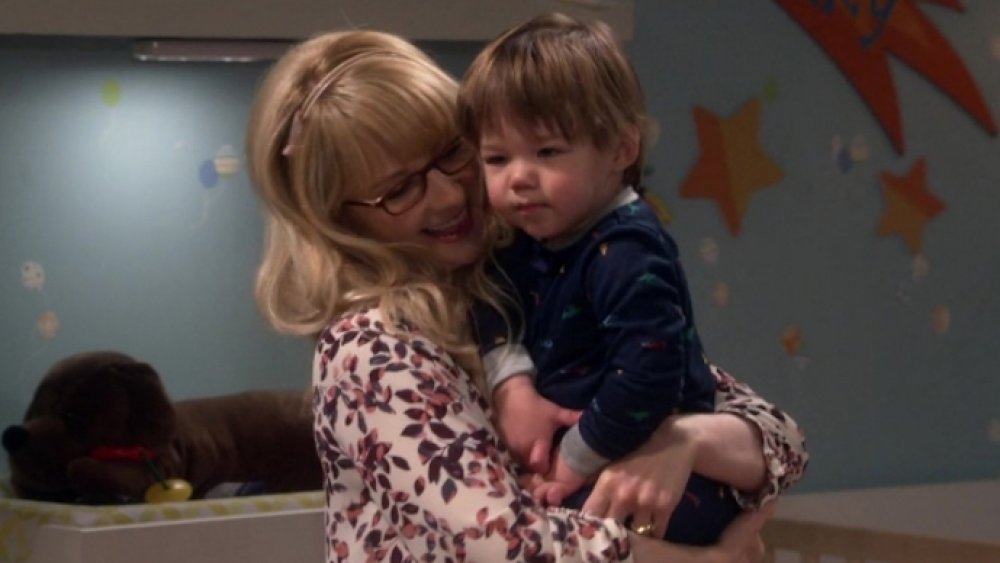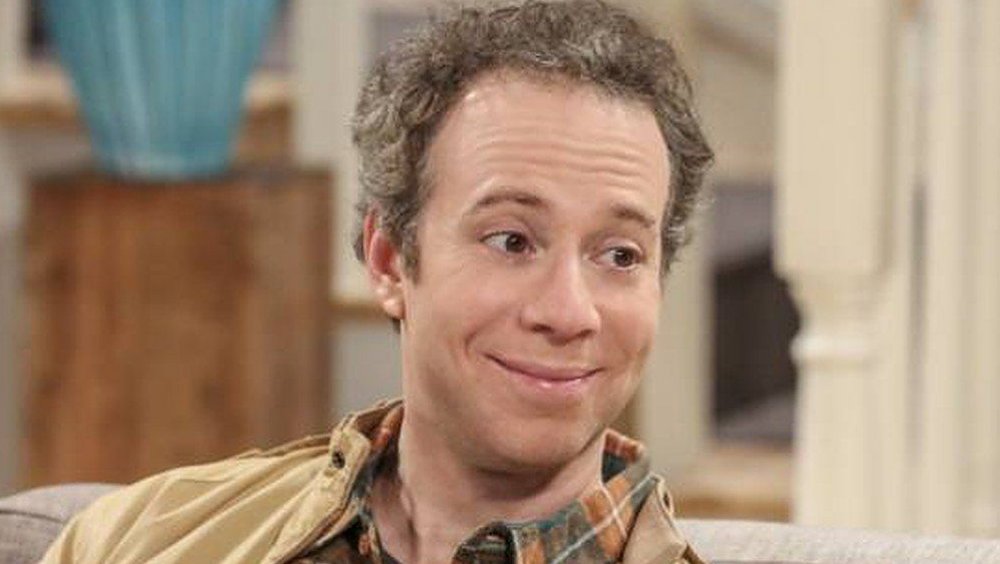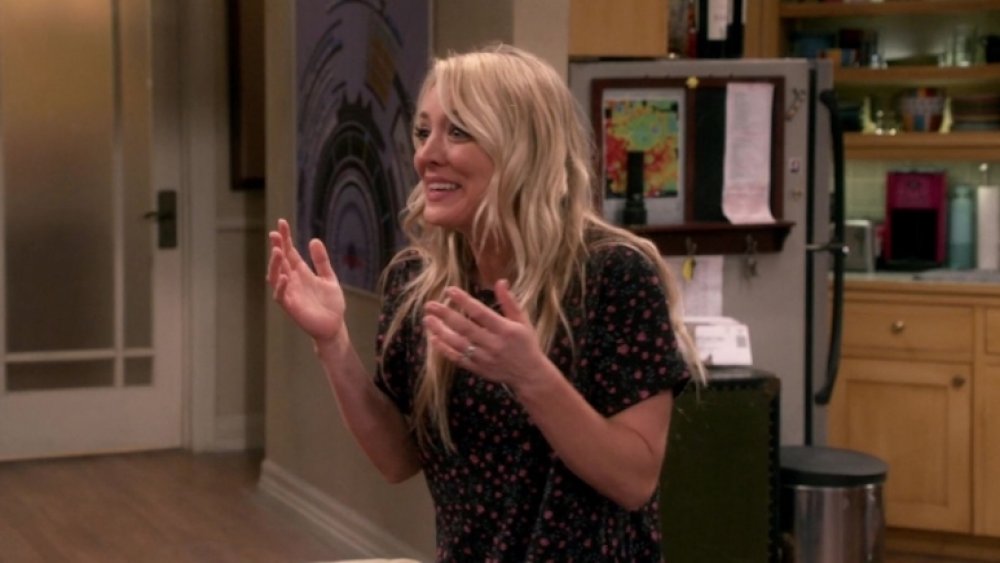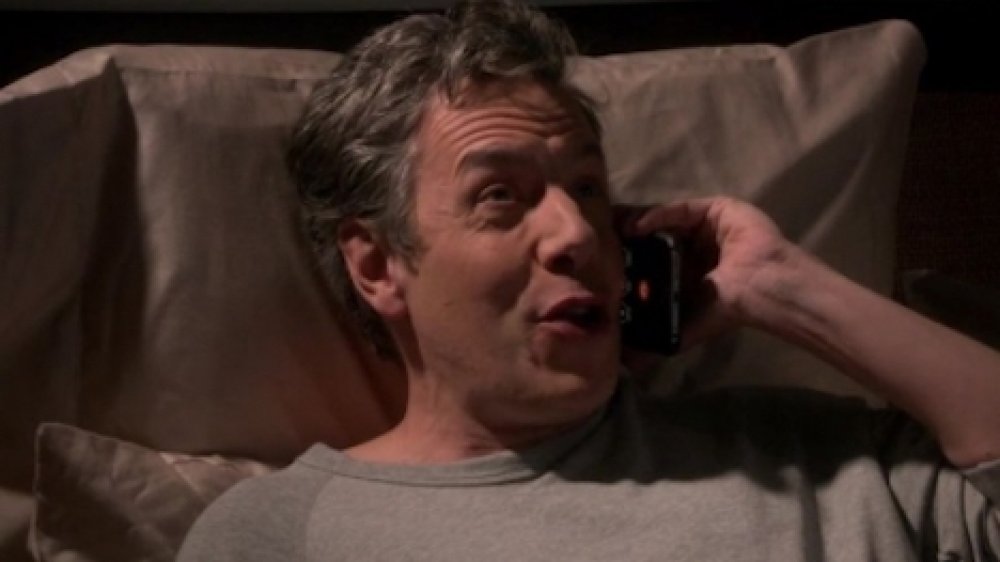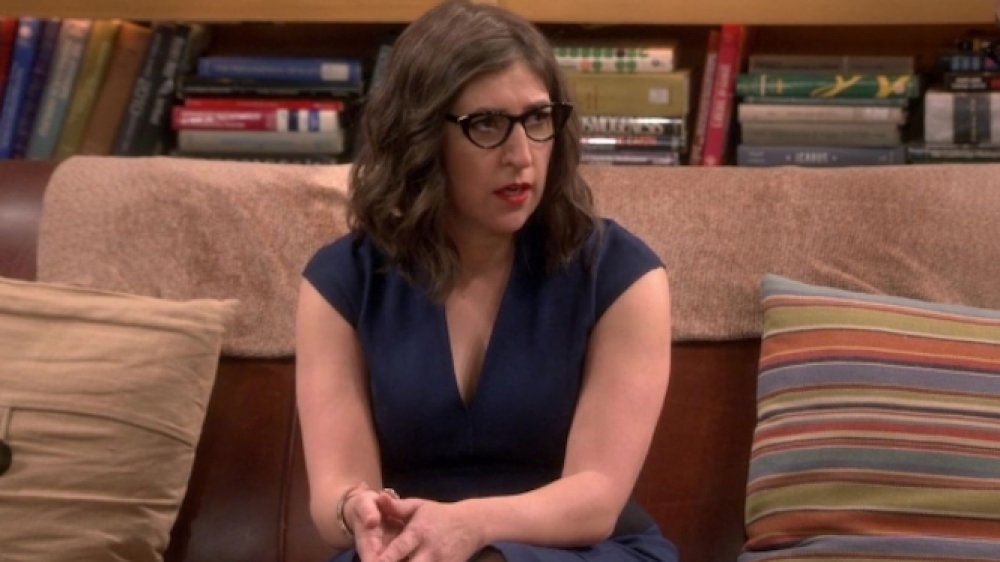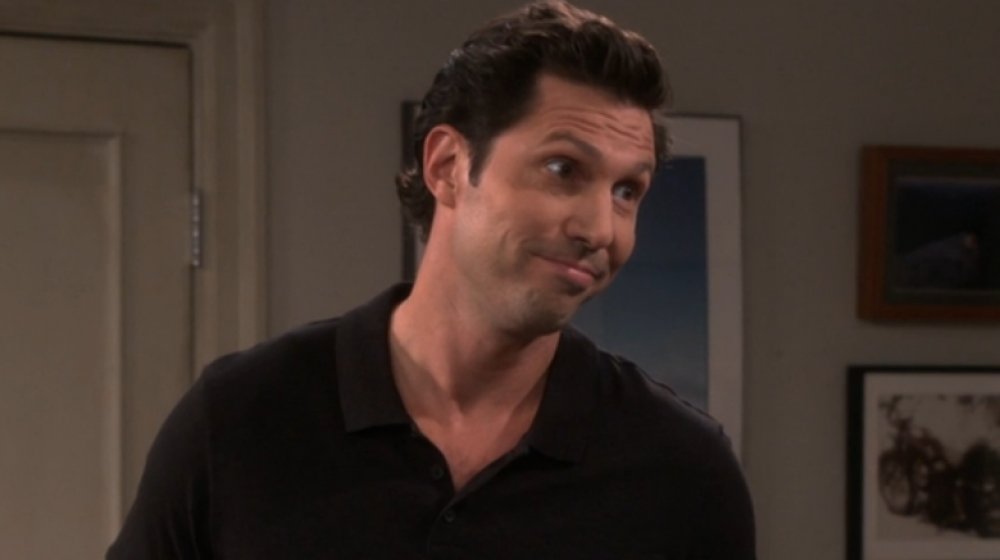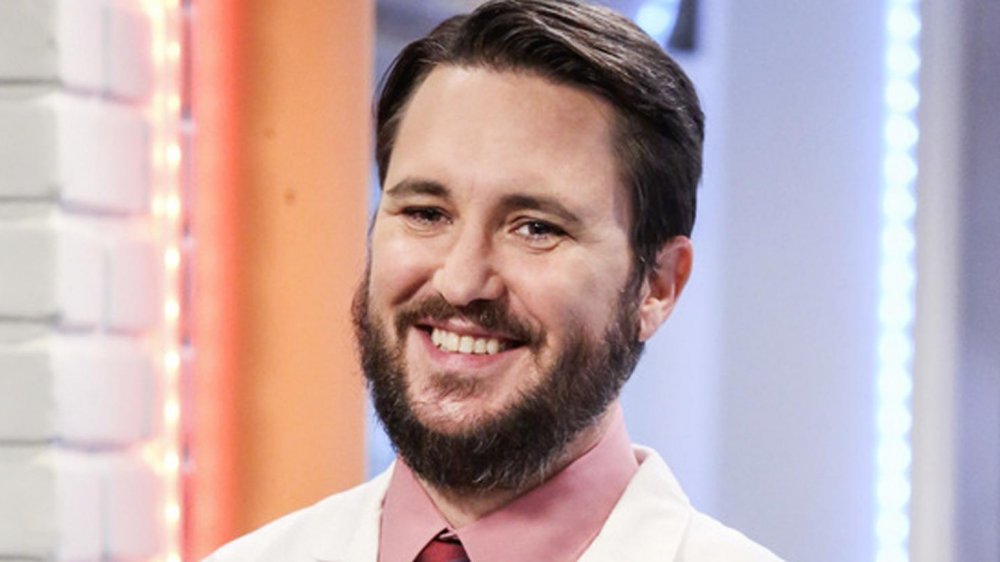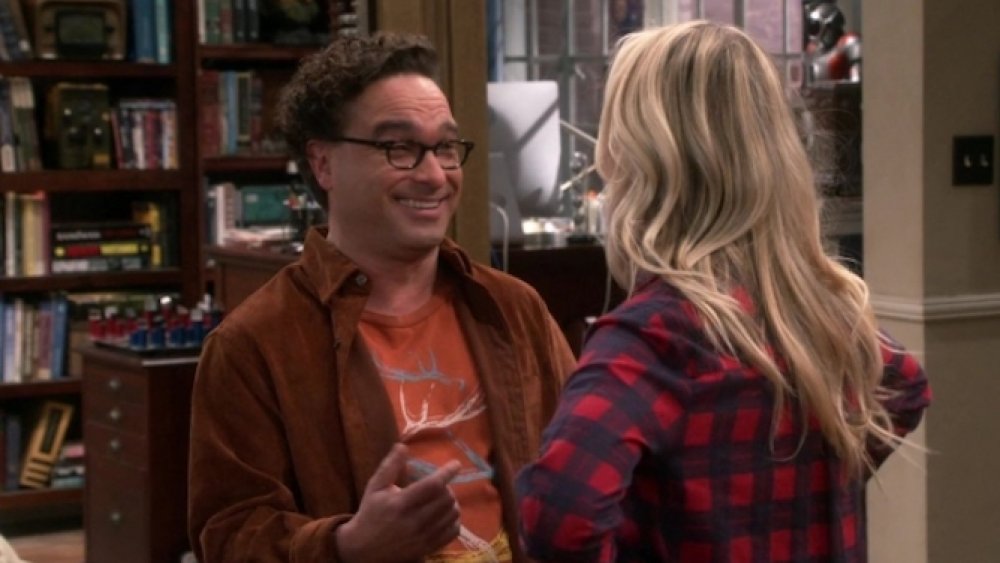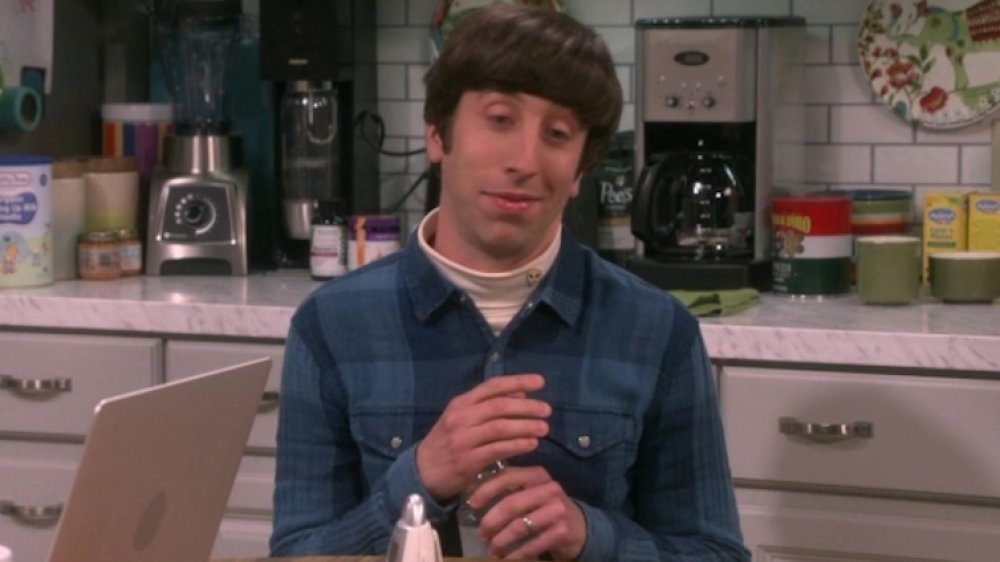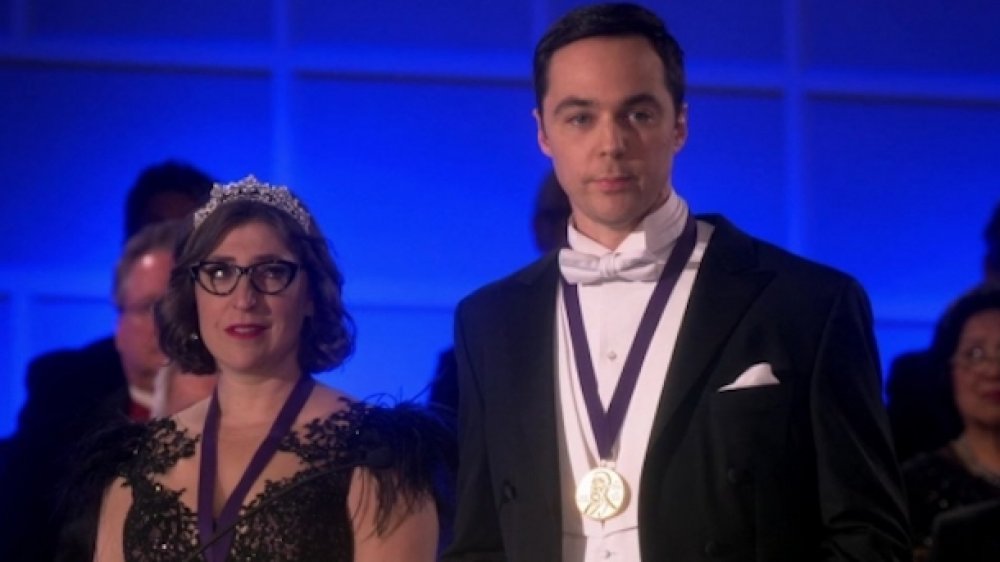The Big Bang Theory Character Endings Ranked Worst To Best
In what was surely one of the biggest television events of 2019, The Big Bang Theory ended its epic, ultra-successful run in May of that year. A whopping 18 million viewers (about average for the top-rated sitcom) tuned in for the two-part series finale to say goodbye to the reliably entertaining band of scientist friends — Sheldon, Leonard, Howard, Raj, Amy, and Bernadette — along with Penny, Stuart, and many of the show's other characters introduced over the years.
Laugh track-fueled, single-camera sitcoms traditionally don't allow for much character development, preferring to tell self-contained stories that start from the same point each episodes, but The Big Bang Theory aired for a voluminous 12 seasons, plenty of time for the show's writers (and award-winning actors) to guide these fictional people to new, often realistic places in their lives. And that includes their endings ... but not all character endings are created equal. Here are the characters on The Big Bang Theory who experienced a full story arc, ranked from the ones with the worst endings to the ones with the best final chapters.
Emily's Big Bang ending is just whatever
By season seven, lovesick and lonely Raj (Kunal Nayyar) has given up on meeting women by traditional methods in favor of an online dating site. But he stops checking his account until a woman named Emily Sweeney (Laura Spencer) sees him on there and writes to him. Through some emailing, they realize that they have a lot in common, and they engage in a slowly developing relationship (despite her previously having a bad date with Howard years earlier).
In fact, the news that Raj has a steady girlfriend is such a huge development that The Big Bang Theory treats it as a bigger deal than even when Leonard and Penny announced their engagement. Sadly, in season nine, Raj messes up this good thing, dumping Emily in hopes of pursuing Claire (Alessandra Torresani), only for her to reject him. Emily shows up just enough more times to let viewers know that she's moved on with a new boyfriend and that intimacy problems with Raj helped doom their relationship.
Raj never finds love
Back when the show started, the four initial male characters on The Big Bang Theory all had very different, clearly stated approaches when it came to coupling up. Howard (Simon Helberg) wanted cheap, tawdry, physical pleasures, Leonard (Johnny Galecki) aimed to be with Penny (Kaley Cuoco), Sheldon (Jim Parsons) found the whole notion of romance a strange distraction from his important scientific work, and Raj Koothrappali harbored an innocent, dreamy, fairy tale idea of romance. He wanted to fall in love with his soulmate and live happily ever after. Nobody wanted to be half of a healthy, gloriously monogamous couple more than Raj, and yet he was the one who struggled the most with his love life.
Early in the show's run, he was too nervous to speak to a woman unless he'd had a few alcoholic drinks in his system. Over time, he maintained a few relationships, but none of those romances — with Lucy (Kate Micucci), Emily (Katie Leclerc), Claire, or the other Emily — worked out, for various, legitimate reasons. Still, when a character's whole thing is to seek out love, it's a disservice that they don't get to have it when their show ends. In the final episode, he pays Sarah Michelle Gellar of Buffy the Vampire Slayer to attend Sheldon and Amy's Nobel Prize ceremony as his date, which is more than a little sad.
Bernadette's ending on The Big Bang Theory involves a couple of kids
Melissa Rauch first popped up as Bernadette on The Big Bang Theory early in season three, when, as a favor to Leonard, Penny sets her up with Howard. They hit it off, and a few episodes later, Rauch permanently joined the cast as Bernadette.
As for the character, she progresses in both her work life and personal life over the course of the show. Starting out as a Cheesecake Factory server alongside Penny to pay for her doctorate, Bernadette eventually becomes a well-paid and highly-regarded researcher at a pharmaceutical company (and brings on Penny as a drug rep). On the home front, Bernadette marries Howard at the end of season five, and five years later, they welcome their first daughter, Halley. Then, almost immediately, they learn they're expecting again, and before long, baby Neil makes four in the Rostenkowski-Wolowitz household. And it's as a harried working mother of two young kids where Bernadette's story is maintained for the final season of The Big Bang Theory, dealing with day-to-day stressors of life without too much really happening with the character.
Well, at least Stuart finds somebody
For most of his run on The Big Bang Theory, Stuart Bloom (played by Kevin Sussman) remains a steady, unchanging character. Stuart serves as a "worst-case scenario" comparison for the main characters. If they consider themselves nerds who have a hard time attracting women and interacting with mainstream society, Stuart shows them that their situation could be a lot worse. He's a sad sack in stasis, the owner and operator of the Big Bang boys' favorite comic book store, a guy who freely discusses his fears and anxieties about the store closing and leaving him in economic ruin, as well as his inability to maintain any sort of romantic relationship whatsoever.
In other words, he's the geek shunned by the other geeks, and the major characters keep him at an arm's length, socially, as if his bad luck would wear off on them. By The Big Bang Theory's finale, however, Stuart has at least finally found love, admitting his feelings for comic store employee Denise (Lauren Lapkus), who returns the sentiment. But neither are considered close enough to the gang to attend the Nobel Prize ceremony in Sweden. Instead, they stay in California to babysit Howard and Bernadette's kids ... which, in classic Stuart fashion, is a disaster.
Penny's ending is actually kinda sad
Penny seems happy at the conclusion of The Big Bang Theory, but is she really? Comparing the Penny at the end of the show to the one at the beginning of the show reveals a changed woman ... but not necessarily for the better. When she moves in across the hall from Sheldon and Leonard, she's bubbly, friendly, and fueled by her dream of becoming an actress and screenwriter. But as the show goes on, Penny's character begins to change.
Dealing with a fussy, rude Sheldon and a tumultuous relationship with Leonard turns her into the show's source of put-downs and eye-rolling, often with a large glass of wine to cope with what her life has become. She never does make it as an actress, apart from roles in a few humiliating B-movies and commercials, and she abandons that career for a more lucrative but less fulfilling one as a pharmaceutical rep. Her romantic life settles down, at least, ending a period of dating boorish guys to marry Leonard, who worships the ground she walks on. In the final episode, Penny tells her husband that she's pregnant, despite making it clear that she didn't want to be a mother. Nothing turned out the way it was supposed to for Penny.
Barry Kripke never stops making fun of Sheldon
Despite Sheldon treating everyone he interacts with — roommates, friends, his wife, co-workers, superiors — with dismissive disdain, hostility, and arrogance, rarely does anybody call him out on his behavior. Instead, they walk on eggshells and follow his endless rules and requirements for interactions, seemingly afraid of setting off an awkward encounter, or maybe it's because his friends are just some very understanding and patient people.
Only one person on The Big Bang Theory absolutely hates Sheldon, and he isn't afraid to let him know. Yeah, we're talking about fellow Caltech scientist Barry Kripke (John Ross Bowie). He's the workplace equivalent of a schoolyard bully who taunts "Cooper," fully expected to be teased back for his lisp. In the final season, Kripke gets his redemption, and he gets to mock Sheldon one last time. Even though Sheldon rejects his request to fund a project, he offers to help Sheldon prove that one of his rivals for the Nobel Prize is a fraud. Later, when Sheldon is awaiting the phone call to see if he won that very big honor, Kripke prank calls him, pretending to be the organizers from Sweden. And that's how Kripke goes out — teasing Sheldon until the very end.
Amy ends the show with the ultimate award
The Big Bang Theory scored a major casting coup when Mayim Bialik joined the cast in season three. Like castmate and ex-Roseanne star Johnny Galecki, Bialik was a former teen sitcom actor, familiar to millions as the title character on Blossom. Additionally, Bialik studied in a field similar to that of her character, Amy Farrah-Fowler. As it turns out, the performer has a doctorate in neurobiology, adding some verisimilitude to her role as a neuroscientist.
In her early appearances, Amy is quiet and lonely, with no one except for her laboratory animals, and she's socially apprehensive due to a lack of confidence. Then Big Bang Theory writers leaned into the idea of having Amy be a match for the also forever solo Sheldon Cooper. They date, Amy falls madly in love, and she has to slowly convince Sheldon to take on every milestone of their relationship. Eventually, the romantically driven Amy gets Sheldon to do things he's never even considered doing, like kissing and getting married. It's no surprise that such a logical, direct, and goal-oriented character would wind up getting exactly what she wanted out of life — the ideal husband to match the ideal career. In the final episode of the series, she achieves what only a handful of scientists ever do and wins a Nobel Prize (alongside Sheldon).
Zack Johnson gets the happy ending he deserves
Before she inevitably winds up with Leonard, Penny brings a few guys home to meet her friends and neighbors, and nearly all are bad guys or just not right for her. However, in the real world, one of Penny's exes made such an impression that the Big Bang creative team kept bringing him back.
Zack Johnson (played with relish by Brian Thomas Smith) is a classic sitcom jock — big, athletic, good-looking ... but also noticeably stupid. Like a human version of a dog, Zack is dumb, but he doesn't care. Plus, he's friendly to everyone, even Leonard, Sheldon, Howard, and the other nerds who — feeling threatened by this man who represented every high school bully who ever dunked them into a toilet or trash can — insult him to his face and talk bad about him behind his back.
Zack is quite likable, and after occasionally returning to The Big Bang Theory, this nice guy gets the nice ending he deserved. At the end of his run, Zack forms a menu design company, and then he sells it for millions. He also gets over Penny and marries a woman named Marissa (Lindsey Kraft), who's just as dim and kind as he is.
Wil Wheaton defeats Sheldon yet again
Sheldon Cooper endures the nasty, childish taunts and pranks of Barry Kripke, but his true enemy is another person — Wil Wheaton, the former child star who played Wesley Crusher on Sheldon's beloved Star Trek: The Next Generation. So what's up with the hatred? Well, Wheaton did him wrong years earlier by failing to show up for an autograph session Sheldon worked hard to attend.
Wheaton played himself over several episodes of The Big Bang Theory, usually to gleefully antagonize Sheldon. For example, in a tabletop game tournament, he explains that he missed that fateful autograph session to be with his sick grandmother, and Sheldon, close to his own grandmom, lets his guard down in a rare show of empathy, leading Wheaton to win ... because he was lying about the whole thing.
In the final season of The Big Bang Theory, the characters square off once more when both are gunning to play children's science show host Professor Proton, a role evacuated with the death of the original actor (Bob Newhart). Wheaton, with his television experience, rightfully gets the gig, devastating Sheldon. It's a fitting end for the well-qualified rogue.
At the end of The Big Bang Theory, Leonard gets everything he wants
Leonard Hofstadter is a brilliant scientist with quite a lot to brag about. He has workplace accomplishments and makes major scientific achievements, but ultimately, the prestigious Caltech researcher has one goal above else. He wants to wind up hitched to Penny and live happily ever after.
In The Big Bang Theory's pilot, Leonard claims he's going to have children with Penny some day. And after some initial disinterest on her part, some will-they-won't-they ups and downs, and dalliances with other partners for both, the pair finally get married and officially settle, putting to rest the plot thread that is their relationship.
However, there is one major issue in the pairing between the energetic actress and the goofy scientist. He wants to start a family, but she doesn't, and they resolve the issue long before the finale, deciding to not have kids because Penny feels so strongly about it. However, in the finale, Penny excitedly tells Leonard that she's expecting. That means Leonard gets his dream woman and his pilot prophecy fulfilled, too. It's another win for Leonard. And on top of all that, near the end of the series, he reconciles his tense and cold relationship with his intimidating mother, psychiatrist and neuroscientist Dr. Beverly Hofstadter (Christine Baranski).
By the end, Howard Wolowitz is a completely different character
The one character that changes the most throughout the 12-season run of The Big Bang Theory — and thus a character who gets to enjoy one of the most definitive, accomplished, and meaningful endings — is Howard Wolowitz.
Way back in season one, Howard was the closest thing the show had to a villain. It's unsettling at best how he relentlessly hit on Penny, even though she stated unequivocally several times that she found both the man and his method unattractive and repulsive. For years, Howard stayed an odious, lascivious creep who hit on most any woman he saw, treating them as objects and potential conquests. Never mind the fact that he never actually attracted a woman, and how he was utterly deluded about his "game," unable to lure any women to the sleazy bedroom in the house he shared with his overbearing mother.
However, the Howard at the end of The Big Bang Theory is a different man entirely. By then, he's been happily married for years to Bernadette, and he does his best to try to make her happy. The only other female on his radar is his toddler daughter, Halley. He's also established a successful career as a scientist and engineer. The dude even went to space with NASA.
Sheldon Cooper has the best ending on The Big Bang Theory
The Big Bang Theory is a sitcom about a group of scientists who are best friends, but it's really the story of Sheldon Cooper. Never before had a sitcom as broad and mainstream as this attempted to include a main character who was one of the smartest people in the world. That's because sitcom characters are generally both relatable and amiable, and Sheldon is neither of those things. Instead, he's much more intelligent than almost everyone. After all, he graduated from college as a teenager and went on to study the secrets of the universe as a theoretical physicist, even though he didn't know how to properly behave around other people.
But over 12 Big Bang Theory seasons, Sheldon Cooper thaws and learns how to be a conscientious person ever so slowly. Sure, it's an extremely tall order, and yet he accomplishes it. And in the two-part series finale, Sheldon wins a Nobel Prize, the ultimate recognition for a high-end researcher of his caliber and a crowning achievement in a career full of scientific breakthroughs. However, the episode's climax is an emotional one, when Sheldon uses part of his speech to express, at long last, profound gratitude for his friends (and wife and co-Nobel laureate, Amy) for their support and patience.
